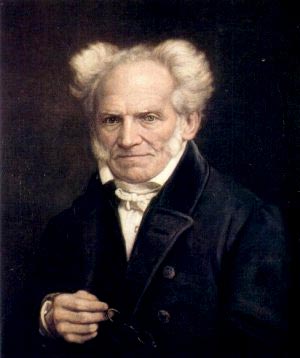Arthur Schopenhauer (1788-1860) on Poetry (Whoever the Heck He Was)

The below excerpts are from Essays of Schopenhauer: Translated by Mrs. Rudolf Dircks, or Sara Hay (Goddard) Dircks.
It is most laughable the way the public reveals its liking for matter in poetic works; it carefully investigates the real events or personal circumstances of the poet's life which served to give the motif of his works; nay, finally, it finds these more interesting than the works themselves; it reads more about Goethe than what has been written by Goethe, and industriously studies the legend of Faust in preference to Goethe's Faust itself. And when Bürger said that "people would make learned expositions as to who Leonora really was," we see this literally fulfilled in Goethe's case, for we now have many learned expositions on Faust and the Faust legend. They are and will remain of a purely material character. This preference for matter to form is the same as a man ignoring the shape and painting of a fine Etruscan vase in order to make a chemical examination of the clay and colours of which it is made. The attempt to be effective by means of the matter used, thereby ministering to this evil propensity of the public, is absolutely to be censured in branches of writing where the merit must lie expressly in the form; as, for instance, in poetical writing.
from On Authorship and Style
Truth that is naked is the most beautiful, and the simpler its expression the deeper is the impression it makes; this is partly because it gets unobstructed hold of the hearer's mind without his being distracted by secondary thoughts, and partly because he feels that here he is not being corrupted or deceived by the arts of rhetoric, but that the whole effect is got from the thing itself. For instance, what declamation on the emptiness of human existence could be more impressive than Job's: Homo, natus de muliere, brevi vivit tempore, repletus multis miseriis, qui, tanquam flos, egreditur et conteritur, et fugit velut umbra. It is for this very reason that the naïve poetry of Goethe is so incomparably greater than the rhetorical of Schiller. This is also why many folk-songs have so great an effect upon us. An author should guard against using all unnecessary rhetorical adornment, all useless amplification, and in general, just as in architecture he should guard against an excess of decoration, all superfluity of expression--in other words, he must aim at chastity of style. Everything that is redundant has a harmful effect. The law of simplicity and naïveté applies to all fine art, for it is compatible with what is most sublime.
from On Authorship and Style
Kant has written a treatise on The Vital Powers; but I should like to write a dirge on them, since their lavish use in the form of knocking, hammering, and tumbling things about has made the whole of my life a daily torment. Certainly there are people, nay, very many, who will smile at this, because they are not sensitive to noise; it is precisely these people, however, who are not sensitive to argument, thought, poetry or art, in short, to any kind of intellectual impression: a fact to be assigned to the coarse quality and strong texture of their brain tissues.
from On Noise
Literary newspapers, since they print the daily smatterings of commonplace people, are especially a cunning means for robbing from the aesthetic public the time which should be devoted to the genuine productions of art for the furtherance of culture.
Hence, in regard to our subject, the art of not reading is highly important. This consists in not taking a book into one's hand merely because it is interesting the great public at the time--such as political or religious pamphlets, novels, poetry, and the like, which make a noise and reach perhaps several editions in their first and last years of existence. Remember rather that the man who writes for fools always finds a large public: and only read for a limited and definite time exclusively the works of great minds, those who surpass other men of all times and countries, and whom the voice of fame points to as such. These alone really educate and instruct.
from On Reading and Books
There are at all times two literatures which, although scarcely known to each other, progress side by side--the one real, the other merely apparent. The former grows into literature that lasts. Pursued by people who live for science or poetry, it goes its way earnestly and quietly, but extremely slowly; and it produces in Europe scarcely a dozen works in a century, which, however, are permanent. The other literature is pursued by people who live on science or poetry; it goes at a gallop amid a great noise and shouting of those taking part, and brings yearly many thousand works into the market. But after a few years one asks, Where are they? where is their fame, which was so great formerly? This class of literature may be distinguished as fleeting, the other as permanent.
from On Reading and Books
We are accustomed to see poets principally occupied with describing the love of the sexes. This, as a rule, is the leading idea of every dramatic work, be it tragic or comic, romantic or classic, Indian or European. It in no less degree constitutes the greater part of both lyric and epic poetry, especially if in these we include the host of romances which have been produced every year for centuries in every civilised country in Europe as regularly as the fruits of the earth. All these works are nothing more than many-sided, short, or long descriptions of the passion in question. Moreover, the most successful delineations of love, such, for example, as Romeo and Juliet, La Nouvelle Héloise, and Werther, have attained immortal fame.
Rochefoucauld says that love may be compared to a ghost since it is something we talk about but have never seen, and Lichtenberg, in his essay Ueber die Macht der Liebe, disputes and denies its reality and naturalness--but both are in the wrong. For if it were foreign to and contradicted human nature--in other words, if it were merely an imaginary caricature, it would not have been depicted with such zeal by the poets of all ages, or accepted by mankind with an unaltered interest; for anything artistically beautiful cannot exist without truth.
from Metaphysics of Love
All the love-affairs of the present generation taken altogether are accordingly the meditatio compositionis generationis futurae, e qua iterum pendent innumerae generationes of mankind. Love is of such high import, because it has nothing to do with the weal or woe of the present individual, as every other matter has; it has to secure the existence and special nature of the human race in future times; hence the will of the individual appears in a higher aspect as the will of the species; and this it is that gives a pathetic and sublime import to love-affairs, and makes their raptures and troubles transcendent, emotions which poets for centuries have not tired of depicting in a variety of ways.
from Metaphysics of Love
Real, passionate love is as rare as the meeting of two people exactly fitted for each other. By the way, it is because there is a possibility of real passionate love in us all that we understand why poets have depicted it in their works.
from Metaphysics of Love
The yearning of love, the [Greek: himeros], which has been expressed in countless ways and forms by the poets of all ages, without their exhausting the subject or even doing it justice; this longing which makes us imagine that the possession of a certain woman will bring interminable happiness, and the loss of her, unspeakable pain; this longing and this pain do not arise from the needs of an ephemeral individual, but are, on the contrary, the sigh of the spirit of the species, discerning irreparable means of either gaining or losing its ends. It is the species alone that has an interminable existence: hence it is capable of endless desire, endless gratification, and endless pain. These, however, are imprisoned in the heart of a mortal; no wonder, therefore, if it seems like to burst, and can find no expression for the announcements of endless joy or endless pain. This it is that forms the substance of all erotic poetry that is sublime in character, which, consequently, soars into transcendent metaphors, surpassing everything earthly. This is the theme of Petrarch, the material for the St. Preuxs, Werthers, and Jacopo Ortis, who otherwise could be neither understood nor explained. This infinite regard is not based on any kind of intellectual, nor, in general, upon any real merits of the beloved one; because the lover frequently does not know her well enough; as was the case with Petrarch.
from Metaphysics of Love
In fact, it is possible for a lover to clearly recognise and be bitterly conscious of horrid defects in his fiancée's disposition and character--defects which promise him a life of misery--and yet for him not to be filled with fear:
"I ask not, I care not,
If guilt's in thy heart;
I know that I love thee,
Whatever thou art."
For, in truth, he is not acting in his own interest but in that of a third person, who has yet to come into existence, albeit he is under the impression that he is acting in his own But it is this very acting in some one else's interest which is everywhere the stamp of greatness and gives to passionate love the touch of the sublime, making it a worthy subject for the poet.
from Metaphysics of Love

1 Comments:
Thanks. Our new performance is called The Death of Schopenhauer. I'll read his views on art somewhere in there.
Post a Comment
<< Home